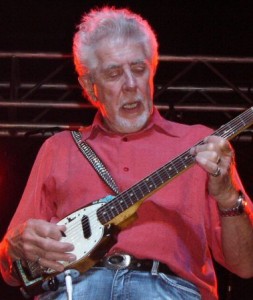But if you say who started the “English” blues movement, which was an integral part of the popularity of the British Invasion across America and the world, really only one name often comes to mind. And that’s John Mayall.
Because without John Mayall, who will grace the Birchmere stage this Tuesday, there may have been no “English” blues.
Mayall was the founder of John Mayall and the Bluesbreakers, arguably the first and greatest true blue English blues band, but more importantly, he was a true professor of the English blues movement, using his innate ability of recognizing talent to help spawn the careers of such musical luminaries as Eric Clapton, who played with the Bluesbreakers in the mid 60’s; Peter Green who would later form Fleetwood Mac with John McVie & Mick Fleetwood, two other Mayall disciples; Mick Taylor, who went on to be the original guitarist for the Rolling Stones, and many other world-class guitarists and multi-instrumentalists.
So one has to wonder, how did Mayall garner such a gift for cultivating such world-class blues players? He’s not quite sure.
“That’s a tough one to answer because I don’t really know myself”, the blues legend, who just turned 76, told me from California recently, with a staggering humility given the superstars he has quietly molded in his bands over the years.
“As a blues singer, being up there kind of puts you in the spot of being a leader anyway, and I know what I like, so I guess it’s my musical taste that comes in handy. And it’s then where I have a hunch about people, and about how they work together, whether they’ve met each other or not. I guess it’s a knack I’ve been blessed with, and it’s come in handy all these years.”
Like many world-class musicians, John Mayall grew up in house full of music of varying styles, and that gave him a chance to figure out which he wanted to concentrate on, but it really didn’t take shape until a bit later in his life.
“When you grow up in a house where your father actually has music playing, you know all the 78’s and the only music you really hear is like jazz stuff you know, so it filters into your psyche, so I guess it’s a great environment to get a start on it. When I started to get into it myself, I kind of veered off, because [my dad’s] stuff was mainly centered on guitar players, but I got hooked on boogie woogie pianists which he didn’t care for very much. So I kinda went my own way using a bit of both player’s influences.”
“But mainly, the music that I was brought up listening to – jazz and blues – wasn’t a popular thing then; well, Dixieland jazz was very popular, but not blues. So it wasn’t until Alexis Korner brought it out into the open in ’62, and by then I was 30 yrs old, so it was just a great opportunity for me to say, ‘Well OK, now this is something I understand, maybe I can have a shot at this, and I might know what I’m doing.’ So that’s how it came about. Me being there starting so late and knowing what I wanted to pursue.”
As the years have gone by, and as some of Mayall’s uber-talented band members have moved on to international fame, he’s stayed primarily in the background, certainly garnering legend status of his own, but all the while staying out of the limelight. And that’s just fine with him.
“It’s interesting that I’ve gotten this wonderful worldwide loyal following, and yet I’ve never had a hit record, I’ve had one gold record in my whole career, never had a Grammy or anything like that. I’m kind of an outsider, but fortunately popular enough to give me a very good living, and a very loyal following. The upside of course is being on the sidelines so to speak, in that I’ve always had complete freedom, artistic freedom, so anything I do people will listen to, so I’ve never been bound by anything that made me famous.”
And what about this legacy he’s created? Did he ever think back when he began his career that he would be regarded as such as a massive musical influence on so many gifted musicians?
“When you look back on things, it gives you that impression, that there is a legacy of sorts, but at the time, you know, living in the moment, I don’t think you ever really think that far ahead. You just hope that the music you believe in will still have an audience later on, and it’s very rewarding to know it’s gone on this long. Once you get involved in the music, you put one foot in front of the other, and you don’t really think in terms of that length of time.”





